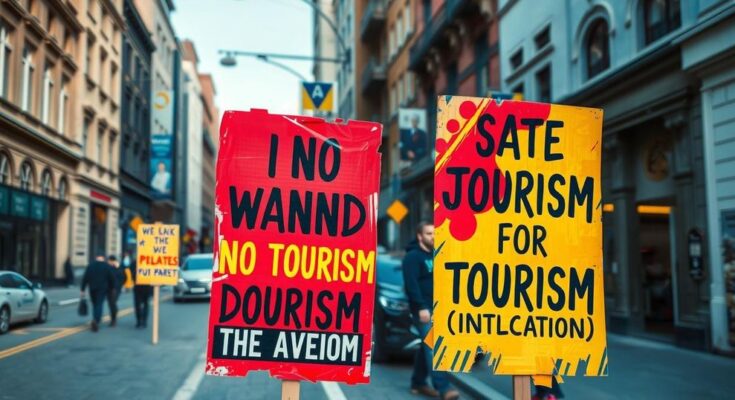Local activists in Cape Town express outrage over the arrival of digital nomads, claiming they contribute to rising living costs and displacement. Events like Nomad Week have intensified the tension, as influencers and leaders call for reform to protect residents’ interests. Similar anti-tourism sentiments emerge globally, with protests and actions against the mass influx of tourists becoming more common.
Cape Town has recently witnessed a rise in anti-tourism sentiment as local activists express discontent with the influx of digital nomads. These remote workers from wealthier nations have become increasingly common in the city, drawn by its culture and climate. Although local authorities appreciate the economic benefits provided by this demographic, activists claim that their presence is driving up living costs and displacing local residents.
An event known as Nomad Week, organized by the city and Work Wanderers, has heightened tensions. Activists from the group Dismantling the Ivory Tower criticized it as a “celebration of displacement” reminiscent of colonial practices. They fear that the wealth of these nomads is exacerbating the housing crisis faced by locals.
South African influencer Naledi Mallela has also voiced her concerns. In a TikTok video, she urged digital nomads to rethink their travel plans, noting, “everything is getting expensive” as tourists flock to attractions, driving prices higher and making basic expenses less affordable for residents.
Cape Town’s mayor, Geordin Hill-Lewis, acknowledged the dual nature of this issue, categorizing the nomads as a potential “blessing to our economy” while affirming the need to create a level playing field. He highlighted that while tourism contributes to economic growth, local residents must not be adversely affected by increased rental prices.
To address this issue, Hill-Lewis mentioned plans to adjust taxation on permanent Airbnbs to ensure fair contributions to local taxes. Additionally, a study by the UNWTO indicated that many countries are now offering digital nomad visas, which has sparked debates on their overall impact on local economies and tourism.
Globally, mounting anti-tourism sentiments have led to notable protests in several countries, especially in Europe. Activists in Spain have taken dramatic measures against mass tourism, blocking popular sites and even setting rental cars on fire in protest. The movement appears to be escalating, with planned gatherings of various activist groups aiming to formulate further strategies against the adverse impacts of tourism.
As the anti-tourism movement grows in momentum across southern Europe, it reveals an enduring conflict between the benefits of tourism and the needs of local populations. Activists remain determined to advocate for local interests while navigating the complex dynamics introduced by the influx of wealthier travelers.
In summary, the influx of digital nomads to Cape Town has sparked significant backlash from local activists who argue it contributes to rising living costs and displacement of residents. Although city officials recognize the economic advantages of this trend, they also acknowledge the need for fair taxation and regulation. The growing anti-tourism movement across various global destinations underscores a critical dialogue about balancing tourism’s benefits with the needs of local communities.
Original Source: www.dailymail.co.uk




